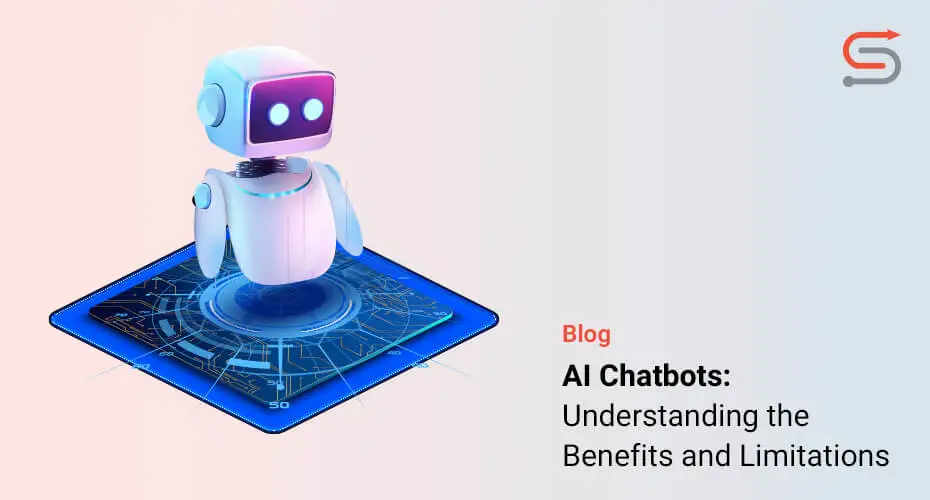November 17, 2023 - by Synoptek
As organizations look to leverage the many capabilities of Artificial Intelligence (AI), customer service is one area that is commonly augmented via AI. As computer programs that use AI to understand user questions and generate automatic responses, AI chatbots are revolutionizing how customers are responded to. But these intelligent bots also bring about several challenges. In this blog, we will showcase the benefits of AI chatbots as well as the security and privacy risks associated with them.

Evaluating the Benefits of AI Chatbots
Recent research has predicted that the global AI chatbot market will be worth $27.2 billion by 2030. AI chatbots find massive applications in the modern business environment, where the skills gap is constantly widening. By engaging with users in a conversation, just like a real human, AI chatbots offer quick and reliable answers to customer queries. They also help reduce the burden on in-house helpdesk teams, allowing them to focus on more strategic aspects of the business.
Using natural language processing (NLP), these chatbots learn and comprehend human language to gather information. They understand the intent and the context of a question and provide relevant answers using a pool of data. As the data evolves, these chatbots automatically train themselves on the new data sets, learn from experience, and prepare themselves for future user interactions.
- In the realm of research and content creation, AI chatbots can quickly gather information, summarize it into bite-sized pieces, and help create content based on the results.
- For marketing and sales professionals, AI chatbots can use marketing and sales data from the internet and generate content for new campaigns, emails, and social media posts.
- In the field of software development, AI chatbots can tap into online resources to write code from scratch, tweak existing code, or solve specific programming problems.
Understanding the Risks and Limitations
There is no doubt about the fact that AI chatbots are incredibly useful and intelligent. But they are still vulnerable to mistakes.
- Incorrect or biased results: AI chatbots can cause the intentional or unintentional use or spreading of information that is false or biased to mislead users. Because AI chatbots rely on a vast pool of data available on the internet, there is a high chance this data is outdated, inaccurate, or irrelevant.
- Lack of emotional intelligence: Even though AI chatbots respond to queries in a conversational manner, they lack the emotional intelligence, empathy, and morality of an actual human. They might answer in potentially insensitive or disturbing ways, that might impact users’ feelings.
- Limited creativity: AI chatbots are also known to fail at out-of-the-box thinking, scoring low on creativity and originality. They have a limited understanding of language and concepts and may provide answers that are irrelevant or incorrect.
- Compliance issues: Despite how useful chatbots can be, their usage might lead to compliance issues. Feeding sensitive business or personally identifiable customer or employee data can result in misuse. Chatbots used by healthcare organizations, for instance, might not comply with strict HIPAA requirements.
- Risk of hacking: As AI advances, bad actors are increasingly using AI chatbots to carry out social engineering attacks. They can impersonate someone else’s writing style to make phishing attacks seem more realistic. At the same time, AI chatbots can create malicious scripts and malware and exploit vulnerabilities, leading to security incidents and data exfiltration.
Embracing AI Chatbot Implementation Best Practices
AI chatbots bring many benefits to the table. But there are also several risks associated with their use. If you want to ensure ethical, unbiased, and appropriate use of AI chatbots in your organization, you must embrace certain best practices.
- Expand training data: AI chatbots produce results based on the information they are fed. To improve accuracy and minimize bias, it is important to expand training data. Make sure to input massive datasets into AI chatbots to enable them to deliver holistic and comprehensive outcomes and results.
- Ensure proper tagging: Just building the right AI chatbot algorithms isn’t going to deliver the right results. You must also make sure the chatbot is trained on good data to drive the right results and meet expectations. Establishing a robust data tagging strategy and investing in the right tools is critical to ensuring the right responses and predictions.
- Use critical thinking: If you want AI chatbots to deliver correct and contextually relevant answers, you must spot inaccuracies in time. Use critical thinking skills to sort through the responses given by AI chatbots. Such thinking can not only help minimize errors but also limit the spread of misinformation.
- Limit sensitive information: Feeding AI chatbots sensitive information can lead to several risks of data falling into the wrong hands. Since any data provided to the chatbot is retained for future responses, you should refrain from providing proprietary business or personal information. It is also advisable to implement robust data handling practices, such as ensuring user consent and encrypting sensitive information.
- Be aware of organizational policies: To prevent unauthorized access to organizational or personal information, it is important to be aware of organizational policies. Understanding the organization’s take on the disclosure of information is important to ensure the right levels of data security. Such an understanding also ensures that only approved AI applications are used at work.
Final Thoughts
AI is advancing at a lightning-fast speed, with innovations like generative AI taking over the world. Offering the ability to simulate human intelligence, AI applications are in use everywhere – from data collection to natural language processing. AI chatbots are being increasingly used by organizations for various purposes, from responding to customer queries to generating content for a marketing campaign, programming new code to processing invoices, and more.
As AI chatbots become mainstream, it is vital for organizations to be abreast of the risks and limitations they bring. Expanding training data, ensuring proper tagging, and using critical thinking are crucial to their success. In addition, organizations must also limit the use of sensitive information and be aware of AI policies to ensure accurate and authorized usage of the technology.
Contributor’s Bio
Ben Sharman is a Security Analyst at Synoptek. With a robust background in the Mid-Market MSP sector, Ben brings forth extensive expertise in Security Consulting, Vulnerability Management, Phishing Identification, Security Auditing, and Risk Management. His demonstrated history in these areas showcases a professional adept at safeguarding systems, identifying vulnerabilities, conducting security audits, and efficiently managing risks for optimal security measures.
